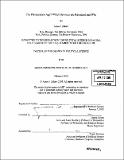The privatization age? : which services are privatized and why
Author(s)
Zehavi, Amos J., 1968-
DownloadFull printable version (21.90Mb)
Other Contributors
Massachusetts Institute of Technology. Dept. of Political Science.
Advisor
Joshua Cohen.
Terms of use
Metadata
Show full item recordAbstract
This dissertation examines the determinants of the extent of privatization of service delivery. Despite the fact that right-wing governments extolling neo-liberal policies have placed privatization at the top of the policy agenda in recent years, there are some services that have experienced very little privatization, if at all. The aim of this dissertation is to explain the considerable variation in privatization experiences across service programs in different policy domains, political systems and over time. The research is based on a qualitative analysis of privatization of service delivery, while funding remains public, in three policy domains - education K-12, mental health care, and incarceration - across three different political systems - Massachusetts, Texas and England. The comparison of the nine case studies revealed significant differences in the extent of privatization across the three policy domains. Privatization rates in education were considerably lower than in the two other domains, while privatization rates in mental healthcare were higher. Despite considerable differences in institutional structure and the balance of right-left power, the differences in privatization rates across political systems did not follow any clear pattern. The explanation for the difference across policy domains primarily focus on institutional factors. Programs in policy domains with many stakeholders are less likely to be privatized than programs that are smaller by comparison. Also, programs that are institutionally stable are more difficult to privatize than programs that are undergoing radical institutional restructuring for reasons unrelated to privatization. (cont.) Finally, the dissertation discusses privatization dynamics in a single program over time. The main conclusion of this analysis is that the private sector tends to increase its political involvement after initial privatization has been accomplished, thus potentially bringing about an acceleration of the privatization process.
Description
Thesis (Ph. D.)--Massachusetts Institute of Technology, Dept. of Political Science, 2005. Includes bibliographical references (p. 392-417).
Date issued
2005Department
Massachusetts Institute of Technology. Department of Political SciencePublisher
Massachusetts Institute of Technology
Keywords
Political Science.